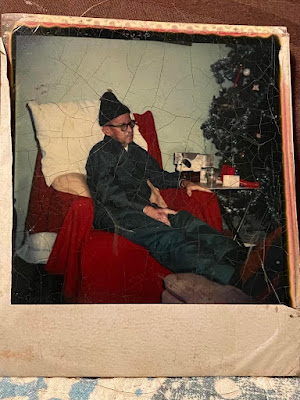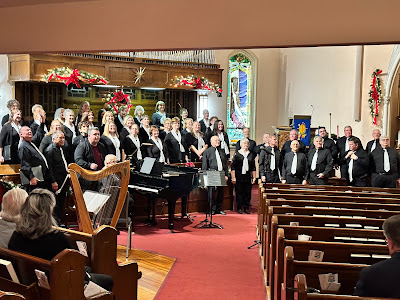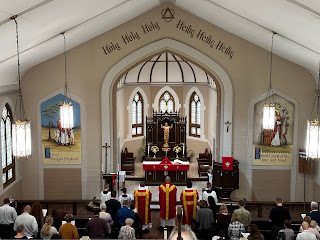26 December 2022
25 December 2022
20 December 2022
Patristic Quote of the Day
Luther
Catechesis: Fourth Commandment
“For if we wish to have excellent and able person both for civil and for Church leadership, we must spare no diligence, time, or cost in teaching and educating our children, so that they may serve God and the world.” —LC I:172.
19 December 2022
Patristic Quote of the Day
Catechesis: Fourth Commandment
15 December 2022
Well, we’re down to…
102 Years Ago
13 December 2022
Patristic Quote of the Day
Catechesis: Fourth Commandment
Luther
12 December 2022
Thinking of something Lewis wrote…
Patristic Quote of the Day
Catechesis: Third Commandment
Luther
11 December 2022
09 December 2022
Patristic Quote of the Day
Catechesis: Second Commandment
Luther
08 December 2022
Patristic Quote of the Day
Catechesis: Second Commandment
Luther
07 December 2022
Patristic Quote of the Day
Catechesis: Second Commandment
Luther
06 December 2022
Patristic Quote of the Day
Catechesis: First Commandment
Luther
Tik Tok Fun
05 December 2022
Patristic Quote of the Day
Catechesis: Close
Luther
04 December 2022
Joyous day!
03 December 2022
Well, it’s been interesting…
01 December 2022
Patristic Quote of the Day
Catechesis: On Catechesis
Luther
29 November 2022
Patristic Quote of the Day
Catechesis: Intro to LC
Luther
27 November 2022
This morning, getting ready for Church…
25 November 2022
Dear Mom,
Well, it’s been 28 years since your earthly sufferings came to an end. I still miss you more than words can say. I don’t think I’ll ever forget the details of that Friday, the day after Thanksgiving that year as it is this year. After I heard that they’d taken you to the hospital, I called and spoke to the doctor. He said that you were trying very hard to die, your poor heart just giving out. I remember telling him to please let you go. But I’m so thankful John and Tammy were there to see you that day!
I wonder if you remember how it was a Thanksgiving years before that we realized something was very wrong. You were staying with us, and Cindi and I had decided to teach you a new card game: sevens. After we explained the rules of the game, it became apparent to us that you didn’t remember numerical order any more. It took a while for that to sink in. How can someone forget the order of numbers? And then we thought back and realized that a year or two before you had given up doing your beloved crossword puzzles and your jigsaw puzzles. We should have known then, or at least gently asked what was up.
Most of the family joined us that Thanksgiving down in North Carolina and we talked about what on earth we were going to do as we gathered on the porch, while Dawn, I believe, occupied you inside the house. We decided to let things alone and just watch for a while longer. Sissy, you remember, was still working at the FBI, as was Jimmy. But it wasn’t long, mom, before we realized that you being alone during the day wasn’t going to work. You called 911 about things that were very real to you, but that just weren’t there. Uncle Edgar came over to help out more than once, as did Doug. Finally, Sis got a sitter to stay with you during the day. That helped for a little bit, but nothing was stopping the change in you.
Cindi and I tried to take you to our home in North Carolina. Do you remember your time there that last time? I think we started with a hospital trip and getting your gall bladder out, of all things! Then the terrible allergic reaction to the medicine (Cindi is a saint!). I remember when I finally had to put a lock on your bedroom door so you wouldn’t wander about at night. I hated doing it, mom. It felt like a betrayal, but it was the only way we could think of to keep you safe. And then when Cindi ended up on bedrest before Rebekah was born, I had to call Sis to come and get you. And she did in an instant. She was such a help! She came and took care of some laundry and other household things before she packed you up to head back to Virginia. I remember telling her that it was getting worse. Mom, your hallucinations were so sad and so persistent. You seemed to be living in a nightmare that never got any better. And you’d reached the point you couldn’t really be left alone.
Still, mom, my heart breaks when I remember that one day. You were crying there in your bedroom at our house. I asked what was making you so sad. You said: “You’d be sad to if you were losing your mind.” It was a moment of lucidity, but what a horrid thing to be clear about! You knew something was seriously wrong. We’d long since ceased trying to argue with you about the things you saw. I just tried to distract you with memories from the past (which were always somewhat clearer, at least for a time). And that moment of weeping and sadness for what you were losing, is the sole instance I ever recall of you ever complaining.
I just commented to Butch and Sis the other day, that the thing that always amazed me about you was that despite your physical ailments, the constant pain from the shortened leg, your headaches and whatnot, you just never complained. You never one time before that instance even referred to your suffering at all. And you certainly did not let it quench your spirit. You were always such a delightful tease!
The last time I saw you, sadly, you were pretty far gone in the loss of your memories. I am certain you had no idea who I was. I tried to feed you, mom, but you looked at me with nothing but suspicion and distrust. I remember I left that day in a very black mood; I stopped in Culpeper at Clore’s on the way home to Maryland and ordered a tombstone for Joe. I think Butch and Sissy helped me with the cost of that; it grieved me that his grave had never been marked; and now poor Maupin doesn’t even have a grave to mark! That was the summer before you died. I think Joe’s death probably did more to hasten your aging than even daddy’s. But a month or so before you breathed your last, do you remember who came to see you?
Yup, your beloved Tommy. He came with Aunt Emma. Emma told you: “Mibby (her special name for mom), Tommy’s come a long way to see you.“ (Tommy lived out in Cheyenne Wyoming.) Without missing a beat, you said: “Well, aren’t I worth coming a long way to see?”
I had taken the call to Illinois by then, the year after Bekah was born. Leaving you wasn’t easy, mom. I remember the fall before you passed away, I read the children “I’ll Love You Forever” and I just lost it. I couldn’t keep the sobs in. I just wanted to go home to see you. But when I stopped the tears, there was still work to do and I had used up my vacation that summer. So I stayed here. I prayed for you. And to this day I feel terrible that I didn’t just pick up and head home right then for a visit with you. I hope you’ve forgiven me for it. I would dearly loved to have hugged you and kissed you one last time.
The day after Thanksgiving 28 years ago, we were expecting our friends, the Whaleys, to drop in for a visit. You remember, Linda, mom? That day Cindi had to go to the hospital for bedrest, it was Linda who came and sat with you. I will always be grateful to her for that. Well, she came through again that day. After her long drive, Linda arrived and set to work packing our car with distractions so that the kids (they were little back then) would have games to play and books to read on the long ride to Virginia. Yes, Linda to the rescue yet again! And so we headed off.
I talked Sissy and Maup into getting you a cedar coffin. We all know how much you loved Cedar. And we did Christmas greenery for your funeral too. Do you remember how each year we’d go out into the woods behind Granddaddy’s and gather the running pine and running cedar and slice some of the holly off of the tree that Ann Field planted by the old house? I can still see you hobbling to the woods, determined to gather the greens to take home to Maryland, cheerful as can be. It seemed fitting your coffin should be decked with them too.
Mom, I remember too the horrible Christmas when you got shingles and you couldn’t wrap your packages the way you used to, always making your own beautiful bows. It was the start of a number of awful Christmases, wasn’t it? Then the year when Peggy almost died of that horrid virus, I think 1970. Then the Christmas daddy was dying, 1979. But you were always our rock. We knew we could count on you. You would laugh and swing your sweat towel and we knew the world was okay. Until it wasn’t. Until you began to be taken from us, memory by memory.
Well, this has gotten a bit out of hand, but I wanted to write to you. 28 years is a very long time to live without seeing you, and I just wanted to tell you how very, very much I have missed you. But your words of wisdom have been and continue to be my constant companions, especially your words from Aunt Annie.
Love you, mom. Can’t wait to see you again.
23 November 2022
21 November 2022
Patristic Quote of the Day
Luther
Catechesis: Monastic Vows
15 November 2022
Patristic Quote of the Day
Catechesis: Monastic Vows
Luther
14 November 2022
Patristic Quote of the Day
Catechesis: Monastic Vows
Luther
11 November 2022
Patristic Quote of the Day
Catechesis: Monastic Vows
Luther
10 November 2022
Patristic Quotes of the Day
Catechesis: Prayer for the Dead
Luther
09 November 2022
Patristic Quote of the Day
Luther
Catechesis: Prayer for the Dead
31 October 2022
Reformation Day Homily for St. Paul Lutheran School
In the name of the Father and of the + Son and of the Holy Spirit. Amen.
Boys and girls, we’re going to think together on this Reformation Festival only about the opening verse of today’s Gospel reading. Remember, it went like this:
From the days of John the Baptist until now
the kingdom of heaven has suffered violence
and the violent take it by force.
I think that in order to understand why this text was chosen for Reformation Day, you need to remember a couple things we way too often forget about the Church: first, the Church is the militia Christi, we are Christ’s army! And so when you are baptized you are enlisted in the Lord’s army, and given your marching orders, which include holding that little piece of earth you call your body and soul as the Lord’s territory where Jesus is acknowledged as the true King to whom you yield your obedience and to whom you give your loyalty.
And here’s another thing we forget: that we’re not in peace time. There is a spiritual battle raging all the time, all around and it reaches even down inside you. And at the heart of that spiritual battle is the attempt of Satan, the Rebel, to retake the territory he’s lost. That means, to get you to switch sides back to him, to return to his revolt and rebellion against God. Instead of bowing your knee to King Jesus, Satan wants you bowing your knee to HIM, of to YOURSELF which amounts to the same thing. It’s all fine with him as long as you don’t serve King Jesus. Anyone or anything else will work just peachy as far as he’s concerned. It puts you back in his rebellion, whether you realize it or not.
Now battle, He gives you weaponry. But the weapons we use are all spiritual. Listen to St. Paul on this: “For though we walk in the flesh, we are not waging war according to the flesh, but the weapons of our warfare are not of the flesh but have divine power to destroy strongholds. We destroy arguments and every lofty opinion raised against the knowledge of God and take every thought captive to obey Christ, being ready to punish every disobedience.” (2 Cor. 10) So Jesus gives you as a shield the gift of faith. He puts the promise of His salvation as a helmet over your head to protect it, and His righteousness as a breastplate to protect your heart. And He puts into your hands the most awesome weapon of all: the Sword of the Holy Spirit, the Word of God. You can see the depiction of it there with St. Paul. So being in Christ’s army doesn’t mean getting to take a wack at people like Peter did to poor Malchus in the garden, thinking he was protecting Jesus. No. It means armed with those weapons from Jesus, the attempt of the enemy to dethrone Him in our lives is bound to fail, even when it waxes violent. And it does wax violent.
The Kingdom has suffered violence from the days of St. John the Baptist. Wherever the message has spread, it has been opposed and people have tried to stop the Word about the true King, King Jesus, from spreading. Across the year’s they’ve locked up those who speak it and spread it, those who print Bibles and share them, and like with John, they’ve even chopped off heads to try to silence it. You know how they killed almost all the messengers Jesus sent, but how the message itself kept moving. The hatred couldn’t stop it. It kept advancing. Kept on capturing hearts for the King.
In the 16th century, Martin Luther experienced a joyous “aha” when he realized that the righteousness God demands from us in the Law is the righteousness He freely forks over to us in the Gospel. He gives us Jesus to be our righteousness, with His unbroken “yes” to His Father made our very own. That’s the big gift of Baptism. And when Luther tried to share this good news of King Jesus and how He spreads His reign through this good news that frees hearts from hating and fearing God and fills them with joy and peace and love, well, Luther found pretty quickly that it was still like Jesus said in the Gospel: from the days of John the Baptist until now…. That now reached all the way up to the 16th century. It reaches right up to today. The Kingdom still endures violence from those who hate the King and don’t want Him to be our Righteousness; and who above all don’t want us talking to others about Him, sharing His Word.
But even though the Kingdom suffers violence, WE, Christ’s army, WE are the violent who take it by force. That means, we ruthlessly put to death in ourselves anything and everything that opposes Jesus and His will and His reign. We seek to be loyal soldiers and hold this outpost for the Kingdom that is our life for Him. It’s an unending struggle to preserve this body and soul of ours as territory ruled by Jesus, since the attacks never stop. And we could never do it without the Spirit’s gifts in the Word and in the Sacraments, where He fires us for the fight, by constantly forgiving our sins.
Today when we celebrate His Supper, we come to receive Him who IS our righteousness. And we will kneel before our living and reigning King. And receive from His own lips, His forgiveness with His body and blood, and that’s how He strengthens us for the fight to keep our lives as His own territory, as His possession where what Jesus wills is the only thing that finally counts. To Him be glory with His Father and the Holy Spirit, now and ever and to the ages of ages. Amen.



















































